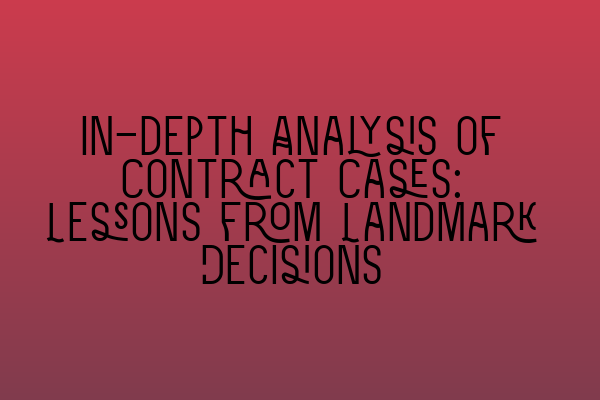In-depth Analysis of Contract Cases: Lessons from Landmark Decisions
Contracts are an essential part of our legal system, regulating agreements and ensuring the rights and obligations of parties involved. Over the years, numerous landmark contract cases have shaped the interpretation and application of contract law. In this in-depth analysis, we will examine some of these landmark decisions and extract valuable lessons for legal practitioners and aspiring solicitors.
1. Carlill v. Carbolic Smoke Ball Co. (1893)
This famous case established the principle of unilateral contracts. The Carbolic Smoke Ball Company had advertised their product as a preventive measure against the flu and promised a reward of £100 to anyone who contracted the flu after using their smoke ball. Mrs. Carlill purchased the smoke ball and later fell ill. The court held that the advertisement constituted an offer, and by using the smoke ball as directed, Mrs. Carlill had accepted the offer and was entitled to the reward.
The lesson from this case is the importance of clear and specific language in contractual agreements. Parties should ensure that their offers and acceptances are unambiguous to avoid disputes or uncertainty.
2. Donoghue v. Stevenson (1932)
This case established the doctrine of negligence and the concept of duty of care. Mrs. Donoghue consumed a bottle of ginger beer that contained a decomposed snail. She fell ill and sued the manufacturer, Mr. Stevenson. The House of Lords held that manufacturers owe a duty of care to consumers, even if there is no contractual relationship between them. This case became a foundation for product liability law.
The lesson here is that parties must consider the potential harm their actions or products may cause to others, even when contractual obligations are not present. Negligence can give rise to legal liability, and duty of care should always be a priority.
3. Hadley v. Baxendale (1854)
In this seminal case, the court established the principle of foreseeability in contract damages. Mr. Hadley operated a mill, and when his mill shaft broke, he engaged Mr. Baxendale’s delivery company to transport the shaft to a manufacturer for repair. Due to the delivery company’s negligence, the shaft was delayed, resulting in significant loss for Mr. Hadley. The court held that damages can only be awarded if they were reasonably foreseeable at the time of contracting.
The lesson is that parties should consider the potential consequences of a breach of contract and assess the foreseeability of damages. If the damages are not reasonably foreseeable, the breaching party may not be held responsible for them. This case highlights the importance of including specific clauses in contracts to address such situations and limit liability.
4. Taylor v. Caldwell (1863)
This case deals with the doctrine of frustration. Taylor hired Caldwell’s music hall for a concert but before the scheduled date, the hall was destroyed by fire. Taylor sued Caldwell for breaching the contract. The court held that the destruction of the music hall rendered performance impossible and discharged both parties from their obligations.
The lesson from this case is that if an event occurs that makes performance of a contract impossible, parties may be relieved of their contractual duties. Frustration can render a contract void, and it is vital to anticipate and plan for unforeseen circumstances by including appropriate force majeure clauses or insurance provisions.
Conclusion
Contract law is shaped by a rich history of landmark decisions. Understanding these cases and the lessons they impart is crucial for legal professionals. The principles established in cases like Carlill v. Carbolic Smoke Ball Co., Donoghue v. Stevenson, Hadley v. Baxendale, and Taylor v. Caldwell continue to guide contract interpretation and application.
To delve deeper into contract law and prepare for the Solicitors Qualifying Examination (SQE), consider exploring SQE 1 Practice Exam Questions or SQE 1 Practice Mocks FLK1 FLK2. Additionally, if you’re aiming for the SQE 2, check out our SQE 2 Preparation Courses as well as our SQE 1 Preparation Courses. Stay updated with SRA SQE Exam Dates and ensure your success in the field of contract law.
Remember, contract law is a dynamic and evolving area of practice. Continuous learning and understanding of landmark contract cases will equip you with the necessary expertise to navigate complex contractual agreements with confidence.
